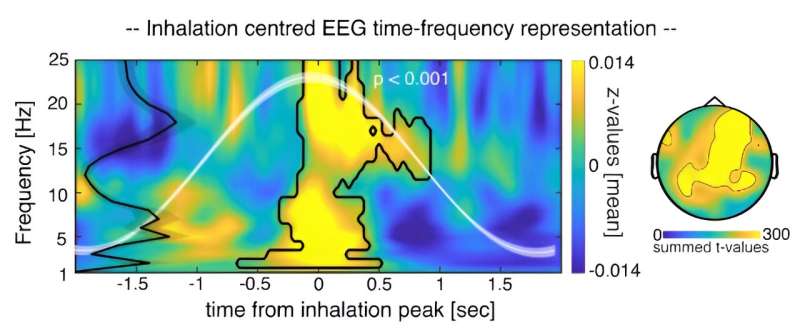This article has been reviewed according to Science X's editorial process and policies. Editors have highlighted the following attributes while ensuring the content's credibility:
fact-checked
peer-reviewed publication
trusted source
proofread
Breathing patterns during sleep found to impact memory processes

How are memories consolidated during sleep? In 2021, researchers led by Dr. Thomas Schreiner, leader of the Emmy Noether junior research group at LMU's Department of Psychology, had already shown there was a direct relationship between the emergence of certain sleep-related brain activity patterns and the reactivation of memory contents during sleep. However, it was still unclear whether these rhythms are orchestrated by a central pacemaker.
So the researchers joined up with scientists from the Max Planck Institute for Human Development in Berlin and the University of Oxford to reanalyze the data. Their results, published in Nature Communications, have identified respiration as a potential pacemaker. "That is to say, our breathing influences how memories are consolidated during sleep," says Schreiner.
Learning processes investigated in sleep laboratory
For their study, the researchers showed 20 study participants 120 images over the course of two sessions. All the pictures were associated with certain words. Then the participants slept for about two hours in the sleep laboratory. When they awoke, they were questioned about the associations they had learned. During the entire learning and sleep period, their brain activity was recorded by means of EEG, along with their breathing.
The researchers discovered that previously learned contents were spontaneously reactivated by the sleeping brain during the presence of so-called slow oscillations and sleep spindles (short phases of increased brain activity). "The precision of the coupling of these sleep-related brain rhythms increases from childhood to adolescence and then declines again during aging," says Schreiner.
Breathing and brain activity are linked
Because respiration frequency also changes with age, the researchers then analyzed the data in relation to the recorded breathing and were able to establish a connection between them. "Our results show that our breathing and the emergence of characteristic slow oscillation and spindle patterns are linked," says Schreiner. "Although other studies had already established a connection between breathing and cognition during wake, our work makes clear that respiration is also important for memory processing during sleep."
Older people often suffer from sleep disorders, respiratory disorders, and declining memory function. Schreiner plans to further investigate whether there are connections between these phenomena and whether interventions—such as the use of CPAP masks, which are already used to treat sleep apnea—make sense from a cognitive perspective.
More information: Thomas Schreiner et al, Respiration modulates sleep oscillations and memory reactivation in humans, Nature Communications (2023). DOI: 10.1038/s41467-023-43450-5




















